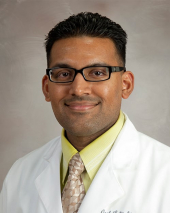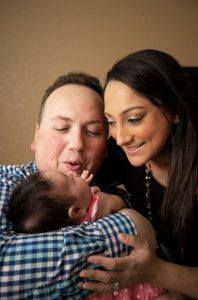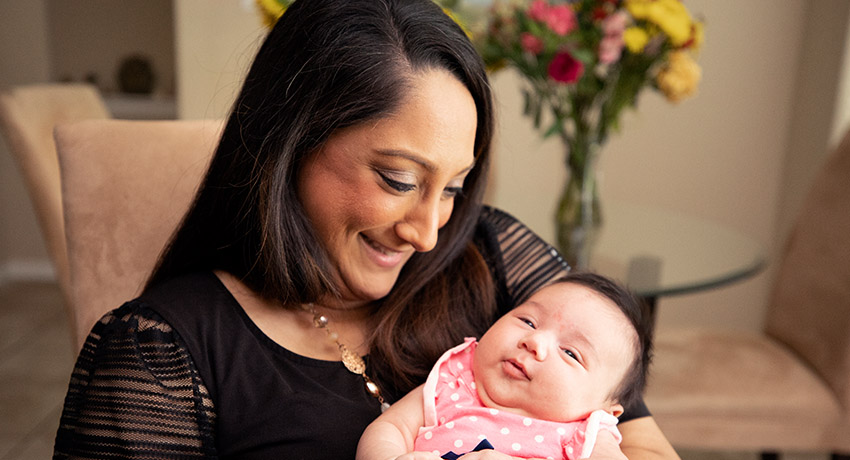On May 27, 2021, Archana and Anthony Acosta welcomed their baby girl into the world, a moment so beautiful because not long ago it was thought to be impossible. After struggling with her diabetes diagnosis and management, Archana sought the help of UT Physicians experts.
Diabetes diagnosis
In 2015, after a visit to her soon retiring endocrinologist, Archana was diagnosed with Type 2 diabetes. Looking back, she recalls feeling ashamed at the discovery.
“It’s pretty widely known that a healthy diet and exercise can postpone or reverse Type 2 diabetes,” said Archana. “Although I had tried several diets in the past, I could not stick to it and always craved heavy caloric and processed foods high in fat and carbs.”
Although Archana was prescribed medications to manage her diabetes, she remained hesitant to seek further care to help manage the condition. Instead, another goal weighed heavy on her heart, becoming a mother.
After struggling with infertility, Archana and Anthony consulted a fertility clinic. They were soon pregnant with their first child. Thrilled with the chance to become new parents, they attended each doctor’s appointment with joy and excitement. Unfortunately, five weeks into their pregnancy a heartbeat was unable to be detected during a routine ultrasound.
“I miscarried on Thanksgiving Day in 2017,” she recalled in detail. “We were devastated because we had wanted a baby for so long and we finally had hope that was taken away so quickly.
It would be two more years before Archana would take the next big step to improve her health and have a baby.
Referral
By 2019, Archana’s Type 2 diabetes had not improved; she struggled with her weight and had problems with her blood pressure. It was then her family medicine specialist with UT Physicians, Kerry Hincks, DO, recommended for the second time she schedule a visit with her colleague, Neel L. Shah, MD, an endocrinologist.
“We are fortunate to have a clinic where specialists can collaborate with primary care providers to better serve our patients’ needs,” said Hincks.
With her fertility goals in mind, Archana begrudgingly made appointments with both Shah and Cynthia Lew, certified diabetes educator with UT Physicians.
“Looking back, it’s so funny to me that I avoided Dr. Hincks’ referral for so long,” she said.
Before her first visit with Shah, Archana remembers her feelings of worry her case would be met with judgment. In its place, she was met with a physician who, instead of saying “you can do this,” would say, “we can do this.” A simple statement Archana says let her know she would not have to make this journey alone.
Treatment plan
To begin, Shah adjusted Archana’s medications and suggested gradual incorporation of light exercise. Lew assisted her with planning nutritional and tasty meals that would not cause her insulin levels to spike.

“I also encouraged Archana to use technology to her advantage,” said Shah, who is also an associate professor in the Department of Internal Medicine at McGovern Medical School at UTHealth. “For example, we placed her on a continuous glucose monitor to get real-time data and she downloaded a fitness tracker to help keep up with her heart rate and steps.”
As the months went by, Archana began to lose weight, dropping over 40 pounds, her blood pressure lowered to a normal range, and her diabetes was under control. She also noticed another wonderful change; she was pregnant.
“After months under his care, my husband and I were able to conceive our baby naturally, without any fertility medication,” Archana happily said. “All I needed was the encouraging guidance from Dr. Shah, healthy living, and the strong management of my Type 2 diabetes.”
Parenthood
While pregnant, Shah monitored Archana’s health closely to minimize any potential risk or complication.

“It’s important for patients with gestational diabetes to be in contact with their doctor,” said Shah. “Archana would send me glucose logs every few days, and we would consistently make adjustments to her insulin to ensure her numbers were in the proper range.”
After nine months, another UT Physicians expert made an impact in Archana’s life. Michelle Wong, MD, OB-GYN specialist and assistant professor in the Department of Obstetrics, Gynecology and Reproductive Sciences at McGovern Medical School, helped deliver their baby girl.
Now two months postpartum, Archana and Anthony are busy parents and loving every second of it. From picking out nursery furniture to simply holding their child as she naps, those little moments are precious to them because of their journey to make it possible.
When asked how he feels having impacted their lives so profoundly, Shah says it’s one of his favorite things about being a doctor.
“When patients have victories, big or small, you cherish them,” he said.



